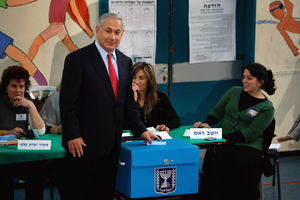 Benjamin "Bibi" Netanyahu, Israel's Prime Minister and strong man since March 2009 and his dominant right-wing Likud Party, could run into unprecedented opposition in the March 17 parliamentary elections. Netanyahu, 65, is seeking his fourth term as PM.
Benjamin "Bibi" Netanyahu, Israel's Prime Minister and strong man since March 2009 and his dominant right-wing Likud Party, could run into unprecedented opposition in the March 17 parliamentary elections. Netanyahu, 65, is seeking his fourth term as PM.Three unexpected developments are surfacing that are expected to make these national elections unique in Israeli political annals.
The first is the introduction of Jeremy Bird, a 36-year-old American political strategist who was field director for South Carolina in U.S. President Barack Obama's primary campaign for the 2008 election.
Bird has come to Tel Aviv with a team of four consultants. His group, One Voice, is being financed by Daniel Lubetzky, a Mexican-born, U.S.-based entrepreneur and philanthropist.
Bird has announced One Voice is not backing any single candidate but wants to recruit tens of thousands of volunteers for house-to-house canvassing, knocking on between 150,000 and one million doors -- a method that was effective in Obama's first presidential campaign in the U.S.
Bird says this strategy could oust Netanyahu, a fervent anti-Palestinian, and the Likud Party coalition, and bring in fresh thinking and new goals for Israeli's government.
The second surprise element in the March 17 elections is the unification of Israel's four Arab political parties under one ticket for the first time. They hope the move will improve chronically low Arab voter turnout in past elections.
New election laws make it harder for smaller parties to enter Israel's parliament, another reason for the formation of the unified Arab political party.
The new law passed last year raised the percentage of votes that a party must win to land a seat in parliament from 2 percent to 3.25 percent -- a law that Arab lawmakers believe was intended to reduce Arab representation in parliament.
Still, the Arabs hope a heavier voter turnout will make them a central player in Israeli politics for the first time and give them a better chance of improving their numbers in the Knesset, the Israeli Parliament, and replacing Netanyahu and the Likud Party.
A recent poll commissioned by the Abraham Fund, which promotes Arab-Jewish equality in Israel, suggests the unified party could boost Arab voter turnout. About 56 percent of eligible Arab-Israelis voted in 2013 and 53 percent in 2009, compared with about 70 percent of Jewish voters.
The poll questioned 514 Arab citizens and had a margin of error of 4.5 percent.
The unified Arab party is a peculiar political marriage of communists, Palestinian nationalists, religious Muslims, feminists and even one Jewish member.
The Arabs hope their consolidation move will increase opposition to the right-wing Likud Party and lead to a new center-left government headed by Labor Party leader Isaac Herzog and former peace negotiator Tzipi Livni.
Many American political observers often forget that Arab citizens of Israel make up about a fifth of the estimated population of eight million, or about 20 percent. The four established Arab parties, known also as Palestinian citizens of Israel, currently hold 11 of Parliament's 120 seats.
Netanyahu needs to form a 61-seat coalition to give him a fourth term.
The Arabs' lack of participation in Israel's democracy since the formation of Israel in 1948 is often misunderstood.
Though they enjoy full citizenship in the Jewish state, Israel's Arabs say they have suffered from decades of discrimination by the native Israelis. Unemployment and poverty is often higher than the national average in their communities.
Israel's Arabs also largely identify with the Palestinian Arabs of the West Bank and Gaza, leading many of Israel's Jewish citizens to view them with mistrust.
Israel's Arab population mainly consists of Palestinian families who remained in Israel following the 1948 war that resulted in the creation of the state of Israel.
The third and possibly the most perplexing issue of all to arise in the upcoming parliamentary elections is expected to be Netanyahu's arrival in Washington March 3 to speak to the U.S. Congress.
House Speaker John Boehner personally invited the Israeli Prime Minister to update American lawmakers on the new tensions surfacing in the Middle East and how they might affect not only Israel and the United States but the entire world.
Boehner didn't inform either Obama or his Republican colleagues before sending out the invitation to Netanyahu - a clear breach of established political manners in Washington.
To top off this unusual set of circumstances targeting the Israeli elections is Obama's decision not to meet with Netanyahu during his Washington visit - also an almost unheard of situation when a visiting head of state comes to town.
And that's the way it is: An excellent scenario for a blockbuster Hollywood movie or a Pulitzer Prize-winning novel.

 By
By 